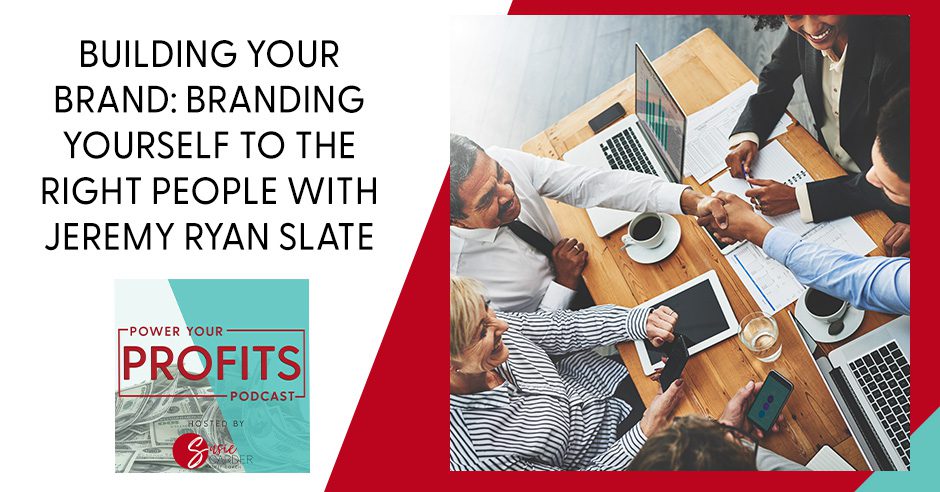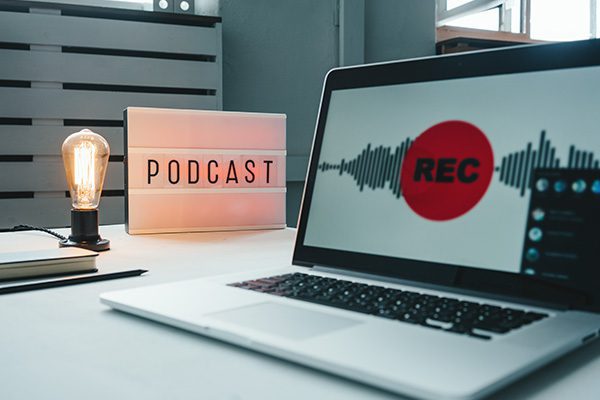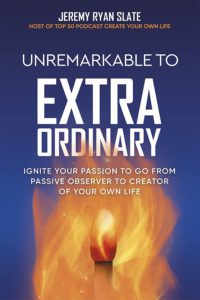
Building your brand is all about how you position yourself in the minds of your audience. You have to build that up by being the brand that they can know, like, and trust. This is where public relations come in and team building, which are all important aspects of building your brand. Join Susie Carder as she talks to the founder of the Create Your Own Life Podcast, Jeremy Ryan Slate about building your brand in podcasting. Jeremy was also named the #1 Podcast to Listen to by INC Magazine in 2019, as well as a Top Influencer by Forbes. He is also the author of Unremarkable to Extraordinary. Learn how to create the right content for your audience and how to build a team with the right partners. Be a person your audience can know, like, and trust today!
—
I am interviewing, Jeremy Slate, the Founder of Create Your Own Life Podcast, which studies the highest performers in the world. He studied literature at Oxford University and specializes in using podcasts and new media to create celebrity and was ranked number one in iTunes New and 78 on iTunes Top 100. He was named the number one podcast to listeners on Inked Magazine in 2019 as well he being named a top influencer by Forbes. After his success in podcasting, Jeremy Slate and his wife Brielle founded Command Your Brand to help entrepreneurs get their message out by appearing as a guest on podcasts. Please welcome my guest, Jeremy.
—
Jeremy, welcome. I’m excited to share you with our tribe and our community. Before I start jumping in. I said your bio. It’s amazing. Let’s talk about your magic. What is your magic? What is your sweet spot? Why are you the jam?
I have had a podcast since 2015 called the Create Your Own Life Show, where I have got to interview tons of world-class performers, and it’s helped me hang my shingle in the podcast space. As of that, people started asking for help, and what we have done since 2016 has helped people to tell a better story on the right podcast and build relationships with that so that they can get their brand out there. I have been doing a lot more with my personal brand as I had a book come out. It’s fun. It was a couple of years in the making. It has been exciting.
Congratulations. It’s a big deal. Now the fun begins. You got to sell it.
That has been interesting as well. I have been doing a lot of podcasts to promote it. We have been doing a lot of YouTube ads. It has been interesting learning the whole thing about how to get a book out there.
I remember the first book I wrote. I’m like, “I’m going to write a book, and I will be famous.”
That’s an incorrect idea people have. For the most part, the ages of people get in the big advance and stuff like that. For most people, unless you are a correct politician trying to get paid off doesn’t exist anymore. What it’s about is solidifying your brand, adding credibility, and giving people another way to get into your head.
That’s what we tell all our students. Let’s talk about how brands can utilize the $1 billion podcast market. A lot of our students have podcasts but they are not making money at it and not leveraging it. Let’s talk about that.
The first part goes to expectations because a lot of people have totally incorrect expectations of what a podcast is going to do for them. It comes from that model of people thinking, “I’m going to start a YouTube channel, and I’m going to be a millionaire. I’m going to create this landing page and be a millionaire.” What you have to understand is that I started my show in 2015.
It’s a little bit different now versus how it was then. It’s a lot harder to start a podcast and become famous because of that podcast. For most people, how it should sit in your business is promoting what you already do and creating that know, like, and trust factor. Giving people a way to know you, like you, and trust you.
The podcasting market is a multibillion-dollar market. Its $1.5 billion in total advertising was spent on podcasts, so there are brands going in on it. Their question is, “Why are they going in on it?” It’s a place to have long-form content. You can’t get anywhere. It’s like people get to know you as opposed to any other form of media, so you are creating a trust for them.
If you want to embrace it the right way, you have to have expectations. This should support your business but for most people, it’s not going to be a business in itself. It should help you to create relationships with people. I have never had to pitch for an event to speak. I always get asked to speak because I’m on lots of podcasts and out to make friends. That’s what I’m trying to do here.
One part of it is how you build relationships. Two is that you can build affiliate offers into it, which is great but it’s not always going to be that high-ticket thing for a lot of people. You want to create that know, like, and trust factor so that when people want to make a decision to work with your company, they are going to do it because they have seen your content, consumed your content, and know you. If you are going to use a podcast the right way, it’s having the expectations and realizing it is a vehicle to help your business grow more. It’s not a vehicle in itself.

People get confused. They think, “I love that you are giving us these distinctions.” Let’s look at PR versus marketing. How do we leverage both? What’s that right combination?
If you want to get more granular in this, there’s more to it than that but in basics, there are three parts to every business. There’s PR, marketing, and sales. PR creates the pieces and the trust for marketing to be able to promote something and to be able to create people that want to buy your service. You can work it either way. You always want to start with PR because people should trust you and know who you are. If you are not selling, then you take a look at the marketing and see if something is broken. If something is not broken, you take a look at, “Why do people not have trust in me?”
PR is creating that know, like, and trust factor. Public relations, to define the term, a public is a type of audience, and public relations is how you relate to that audience. Your public could be other business owners. It could be teachers. It could be all different types of people. That’s a public, the group you want to understand you.
Saying my audience is everyone is not a good thing because you are not going to have a public that can relate to you. In that way, it’s creating the factor where people know, like, and trust you. Marketing is the actual action of promoting the pieces you’ve created, adding traffic or concepts to get it out there, and then sales are people coming in and wanting to buy your product and service.
You can take a look at it like, “Marketing is promoting the actions. PR is creating trust.” If you are spending a lot on paid traffic or things like that, you may want to take a look at the public relations program you are doing because people may not trust you enough. People often look at, “Is the copy written right? Is the targeting right?” Those things could be perfect but if people don’t trust you or you don’t have relevance to them, those things aren’t going to work as well.
When you look at your business, how are you building trust? There is a strategy. The know, like, and trust factor. What are some of the things that you do as a business so that people see your authenticity and transparency?
Part of it, frankly, is like drinking our own Kool-Aid, so we help people to get on podcasts. One of the main ways that we promote our business is by having me on other podcasts. In terms of content creation as well, I’m big on long-form written content. I do contribute to a bunch of different websites, which is helpful because it creates trust there. I also have hundreds of posts that I have written on our company site and my own site and things like that because people need to be able to get a win from your content and learn from your content.
We are focusing hard on podcasts we are appearing on and adding value. Written content is a big deal. When I say written content, I mean articles should be a minimum of 600 words because you want something people can get a ton out of that. The sweet spot is 700 to 900 words for a great article because it’s not an info piece but something people can get a lot out of.
Trying to do a great job with my own podcast helps as well because what we do is in the podcast space. I’m trying to constantly get higher caliber guests, reaching out to celebrities, athletes, and people like that, and building that brand creates trust too. Those are the main ways that we are doing it. When people understand how to use a podcast guest appearance, there’s also wrapping your head around that.
A lot of times, people think, “I get in front of X number of people. These many people opt-in. These many people buy my product,” and that’s not the case. What you are doing is you are creating a relationship and awareness but you also want to give people a place that can continue that relationship. We usually say, “If you are going to give something away on a podcast, it should be like a survey or an applicable tool to what you talked about.” When you are looking at education, it has two parts. It has the actual theory and the doingness of it. You want to get people to something they can do after that interview, and it brings them into your world. You can then market and sell to them, and things like that.
That positions you as the go-to in your space. What else are you doing to position yourself as to be the go-to person in your space?
One of the biggest things in the branding world, there’s the concept called positioning, and positioning is what you are seen for against. You are grabbing something from people you are already familiar with and that spot in their brain. I hate this one the most but it’s the one people are most familiar with, so I’m going to use that. That’s where people say, “We are the Uber of blank.”
[bctt tweet=”People need to be able to get a win from your content and learn from your content.” via=”no”]
They are taking something people are familiar with. They are like, “I know what Uber is, so I have an idea of what you do.” The way you can hack that positioning in your space, frankly, by having your own podcast, is by interviewing people that are experts in your space. When I say that, I mean also niching down on that. Niching down until it hurts almost because that broad audience isn’t going to help you. By talking to other people that are in your space, you are enhancing your own positioning because now, when they think of X, Y, and Z influencers, they think of you. When you are able to do that, you are able to enhance your positioning like, “What positioning are we trying to achieve here?”
Give me an example of that in podcast space, for example. Who would be the person or the people that you would interview so that people see that?
It’s changed a little bit from where I started but I will give you an example early on. Grant Cardone was a big positioning person for my audience. He was 1 of the first 100 guests I had on the show, and that helped me get a lot of credibility that I still have to this day because of that. People have come and joined my audience because of that. When they landed on my site, they saw that as credibility. For me, that was good. It’s interesting in the PR world because other PR agencies don’t always want to talk to you. In that way, you have to use more celebrity credibility and speak to different audiences to do that, if that makes sense.
Share with us how we measure the success of the podcast. You have downloads. You’ve hit number one on iTunes. You’ve hit the top 100. Let’s talk about that. How do we measure it versus, “I have 100 interviews or whatever?” Like, “Who cares?”
There are a couple of different things I’m looking at. I don’t think downloads and things like that matter that much. The thing that ranks you in Apple Podcasts since it changes every 24 hours is subscribers. Driving subscribers is the big thing that changes the game for ranking but I don’t put a lot of emphasis on ranking because those change every 24 hours.
The thing you need to be looking at and something we do every single week we do a Google search for my name, the company name, and any of our services in quotation marks. We then take a look at based on that how many results and pages on Google we have now. If we are doing that, then I’m becoming more relevant. That’s what I’m looking at.
Media hits are a big part of it. We are also taking a look at Google News Alerts is another one. Alerts.Google.com. We set up alerts for my company name and my name in quotation marks, and then we are tracking those hits as well because that’s showing relevance. Those are the things that I’m looking at with PR because everything else is so hard to track, that we are taking a look at media hits and what’s out there because that is creating that know, like, and trust factor. The reason I use quotation marks is that you are going to get a lot of things that aren’t relevant to your search if you don’t use that.
Who’s managing that for you on your team?
We have our marketing team managing that. We also have somebody on our team that’s called a brand ambassador, and that person as well is doing calls with previous and new prospects. A lot of times, he’s gauging, “Where did you hear about us? What media piece did you come off?” A lot of times, they are from media pieces. Our marketing teams monitor that, and then we are also doing one-on-one surveys when people come and find out about us.
Let’s look at the growth. How your Command Your Brand grew 71% in a down economy? Give us the hacks that you did, and how do we apply those principles?
The shocking thing about it is that it wasn’t about hacks. 2020 was a unique opportunity for those of us that have been online because we have been online for a long time, and the economy changed drastically. The things that we focused on were people and processes, and that’s what caused us to grow. When the employment market changed, a lot of people who were out of work that weren’t previously out of work. We started hiring. When that happens, a lot of people run away from a situation like that.
We ran towards it because we have been online, have the processes, and understand it. The biggest thing we focused on was hiring and training because if you have the right people and know what they are doing, you are going to be head and shoulders above a lot of other people. We focused on hiring and training when everybody else was letting people go and not focusing on that, so it was one part of it.

The other part about it too is we took a look at processes within our company. Often you see a couple of different things in business. You see businesses that have no processes, and that’s scary because you are like, “You are the salesperson. Figure it out.” They are like, “What am I selling, and how do I sell it?” That’s a huge problem.
The other part about it is that they don’t consider different ways people learn. The thing we look at when we are creating a process is number one, we are a little maniacal about it. The first position that created our company is the publicist job, and that’s the person that works with podcasts, podcasters, and clients. That actual document on how to do that job is 47 pages long because we are maniacal about it.
What happens is if somebody has to come back and ask you, “How do I do this?” then that creates a problem, and you get taken off of your job and things like that. That’s one part of it. The other part about it is of those pages, every 5 to 10 steps also have a video or a screen recorded video depending on what’s necessary because people learn in different modalities.
Somebody can read it and be like, “I get it.” Whereas another person can look at it and be like, “I get it.” We are trying to make sure that people are trained well. After that, we also have all our staff on administrative training because we manage our business by statistics and want them to know how all that works. They also have a minimum requirement of two hours of training a week, which is paid training, obviously, but we are focusing on people, processes, and training, and that was the biggest thing to help us to grow. It wasn’t a hack. It wasn’t like, “We found this loophole.” It was rather than running away from economic changes. We ran towards it and embraced it and tried to do a better job in that.
How big is your team?
It’s not a huge team but we have twenty people on our team. We have managed to do quite a bit with that size team.
Give me an overview of the organizational chart. What does it look like for your company?
I hold the CEO post, which also runs our sales team. My wife, Brielle, is our COO, so she runs all operations and quality control. We have Josh, who’s our Brand Ambassador. He runs new public contact. Talking to new people and running our people that do that. We also have our Director of Marketing, Lawrence, that runs our marketing production team and things like that. That’s how it works for us, and then we get a little bit more granular, and we are looking at different positions in the company but that’s the main executive team.
It’s important. We are speaking the same language. Everyone wants a hack. There’s no hack. There’s consistency. I love that you spent time training and developing. We did the same thing.
That’s the biggest problem. Everybody wants a shortcut to success. I take issue with people like Gary Vee being, “Don’t do stuff you don’t like to do.” If you want to run a business, at some point in time, you are probably going to have to do it. Grow enough so that you don’t have to do it for the future but anything you don’t understand in your company, you become the adverse effect of, so you have to be able to understand it. You don’t have to do it all but you are going to have to do it through growth.
How long have you been a business owner?
We have run this company since 2016.
[bctt tweet=”You’re going to be head and shoulders above a lot of other people if you focus on hiring and training.” via=”no”]
Was this your first company?
Before that, I tried a lot of different things. It didn’t work. This is our first company that grew, expanded, and made a big impact. Sometimes, you have to be willing to work those things through, and I have learned something from each one of those experiences that didn’t work out.
I was talking to a client. I’m like, “This model is broken. You need to shut it down.” She’s like, “I’m a failure.”
Failure doesn’t matter.
Take all that learning and go, “What do we need to do now because this model is broken?” You keep putting money, time, energy, and resources into a broken strategy. It’s frustrating.
That’s something society looks at funny. You failed. It didn’t work out. You are embarrassed or whatever it may be. My first business and I didn’t even know what it was at the time when I started, was network marketing. I made a decent amount of money but after a while, I got annoyed with recruiting people and all that stuff. I went from there to selling life insurance.
I private labeled and sold products and Amazon for a while but I ran into some issues with keeping up with inventory. I have learned something from every single one of those experiences. I have my Master’s in History. I was a high school teacher. I had no business experience. It was like a bootcamp for me.
Let’s talk about if you look back at all of that, and some people call them failures. I call them learning lessons. What would you say in this business or the other ones because those are juicy too? What was your biggest failure, and then what did you learn from it?
The first version of our company which we started in 2015, was called Get Featured Media. Part of that company later became Command Your Brand but we initially had another business partner. The thing that we ran into, and I don’t think people consider this is that getting a business partner is a lot like a marriage.
You have to consider like, “Do you want kids? Is this going to be something long-term?” You get excited, and you don’t consider these things. A lot of times, we tend to say, “That person is bad,” or whatever it may be. If we didn’t consider those things at the beginning, whose fault is it but your own? One of our cofounders at the time wanted to make our business an app, which we were very against.
It’s because of that we did multiple 6 figures in our first 6 months of business but we had created this house of cards for ourselves because this guy wanted this, my wife and I wanted this, and we were the three cofounders and came to blows on it. The thing that I learned, frankly, was number one, having everything written up better in a contract because you need to have ironclad contracts when you are going into business with somebody, and that’s important.
Number two, the biggest thing I learned was making sure that you are on the same page and on the same page of where you want the future to be 2 or 5 years from now or whatever it may be and not just looking at what looks good now. That’s the biggest thing is seeing, “What is our future like in this?” As I said, it’s like getting married. If you are dating somebody that doesn’t want kids, and you want kids, and you are getting engaged, that’s a problem.

I had the same experience. I had two business partners. Two separate businesses. You think I learned the first time. I then realized, “I was afraid to do it on my own.” Thinking that you brought more credibility or something, and somebody always thinks that they work harder than you work so that is juicy.
That’s interesting too because, at that point in time, I was wearing the COO role. The issue was that I didn’t have enough confidence in myself to run a company, which now I have done quite successfully. At that point in time, it’s also having the confidence in yourself to say, “I’m going to take a stab at this. If it works, it works. If it doesn’t, it doesn’t but having confidence in yourself is important.
I love what you say because we say the same thing. It’s a marriage. Would you marry this person long-term? That is all the good, the bad, and the ugly? If you have been married, you already know that works.
Let’s say you are in a company that doesn’t work out, and it’s still going. It didn’t fall apart and break down. You got to figure out, “What’s the valuation? Who gets assets? Who gets what percentage, and what happens to the clients you are still servicing?” These are all things that you don’t consider.
Let’s shift a little bit, and let’s talk about wealth strategies. What are the wealth strategies that you’ve put in place for you and your family? Building your company is one wealth strategy.
The primary thing we focused on is whole life insurance but whole life insurance from the perspective of you get a good policy where you make 5% on it and if you borrow against it, there’s only a 2% penalty, so you are still making 3% on it even if you are using it and paying it back. That has been our primary way of cutting off banks when we need to borrow money. We do have a house but I don’t see that as an asset most of the time because it takes upkeep and everything else but for us, we focus primarily on whole life insurance. That has been the big thing for us.
There are so many businesses that are struggling. You see it, and I see it every day because of the economy and the pandemic. What has been your secret sauce? Can you talk about it a little bit like training and developing people? What has been your secret sauce to staying motivated for yourself? I was texting my friend. She’s like, “I need some inspiration.” She feels beat up. I get it. As an entrepreneur, you are isolated in this box of, “I’m the butcher, the baker, and the candlestick maker. I’m the champion for everyone.” What has been your secret sauce personally as the CEO to stay in action and keep growing?
There are a couple of different parts to this is, and we are going to break this down a little bit. One part for me that’s important. I have been a competitive powerlifter since I was a teenager. Fitness has been a big component of my life. The first thing I start every single day with is working out. I’m at 35 and don’t do what I did at 21 but I still work pretty hard. I deadlifted 550 pounds. These are things that I do to feel good, and it keeps me going every day.
A bench press or a deadlift, what was that?
A deadlift is where you hold the weight at your waist and stand up from the ground with it. A bench press is where you come down at your chest. I do about 325 like that.
What did you do in the 500?
It’s the deadlift. I can’t bench press that. I’m a little guy.
[bctt tweet=”Anything you don’t understand in your company, you become the adverse effect of.” via=”no”]
You got some guns. We are going to the gun show.
I used to be a competitive powerlifter in my twenties. I’m 5’7”. I was 225 at that point in time. Deadlifting 630, squatting 700 and benching 455. I don’t do those numbers anymore. I’m 160 pounds but fitness is a big component of my life and keeping my head right. That’s one part of it, and this is going to sound weird.
You’ve probably never had anybody say this to you but the biggest thing that chills me out and the reason why I don’t have a lawn company is riding my lawn tractor chills me out. My wife always knows that if I’m mowing the lawn, it means I have a bad day. For me, that’s my me time. I put on a podcast and drift away and do what I’m going to do but mowing the lawn is therapeutic. You probably never had anybody say that to you before but it’s therapeutic for me.
It’s not even a lawn mower. It’s a lawn tractor. That’s a whole other level of the grass.
I live on 5 acres here, so I have chickens, pigs, and all that stuff. Playing farmer calms me down. That’s on a personal level but on a business level, one of the things that’s important is, number one, we meet with our entire team every Friday morning. I find that a lot of people do their staff meetings on Monday. I find that’s a waste of time because you are already behind the eight-ball if you are starting on Monday. Friday is when we plan for our week. We do our main team meeting. We do our executive meeting, and then we have our individual divisions that meet.
We do that all on Zoom. We do the best we can with that. We also have WhatsApp threads for each individual team so that everybody can get each other excited. That has been one part of it. We also play a lot of games. A game we did in May 2022 was if we hit a certain revenue goal and also a certain number of podcasts booked goal. We bought the whole team tickets to go see Top Gun in IMAX.
Everybody got excited, and they were all playing for Top Gun and all shot videos for it. That was a game we were doing. Now, we are playing a revenue game. If we hit the revenue goal for the month of August, we are taking the whole team to Cancun, Mexico, for a weekend getaway trip. We try to play games that are exciting and that everybody can have a part of, play, and have fun in. That’s super rewarding because then, they say to each other, “What are you doing to pull your weight? How can I help you or whatever it may be?” That makes it more fun and tries to keep everybody in a state of games.
You do have a gift for us which I love your generosity. Let’s talk about what you have for our readers to get to know you more and to build that know, like, and trust. Why I love you, you walk your talk, so share with us what you are you are giving us.
I have a great resource for your audience called The 7 Reasons You are Not Getting on Your Favorite Podcasts. It goes over all the basic PR actions that you are going to need to get yourself out there to grow your brand and get more attention. You can get that over at CommandYourBrand.com/7reasons.
Talk about your book because you do have a new book which I’m very proud of you.
I know it’s a little thing but that was important to me that we are in bookstores. It is a physical book it’s called Unremarkable to Extraordinary. I feel like we are all born unremarkable. It’s the things we do that make us extraordinary. I have talked to over 1,000 people in several years I have had my podcast and have taken a look at what are those things that each and every one of them do that have helped them become extraordinary. I take these stories and break them down in a way that you can take these things and use them in their life. It has been cool to see people’s feedback on how they have been able to use the book in their life. If people want to get that, that’s over at GetExtraordinaryBook.com. It has been a great experience.
I’m so proud of you. I want to acknowledge you for that. Thank you for being here. Is there anything you wish I would have asked or should have asked you based on this conversation?

A book recommendation because there is one book that will change every reader’s life and because it changed my life. It was Episode 52 of my podcast. The author’s name is Cal Newport. The book is called So Good They Can’t Ignore You. Often, we have this false idea of following your passion versus finding your passion. If you are following your passion, you are probably going to be following it for a long time. Whereas finding your passion employs you are going to have to do some things, you don’t like. You are going to have to work hard, and you get in this area where when you get good at something, you become passionate about it. That’s how you can find your passion rather than follow it.
I want you to know how he seated that. That’s a great strategy. Giving tools and giving strategy. I love that you walk your talk, Jeremy. Thank you.
Thank you.
If you love this show and you know people who need Jeremy. I need you to forward this to your friends. Please subscribe to our channel. Share Jeremy’s message so that more people can find him, so he can get seen, heard, and paid. Jeremy, thank you for being here and thank you for being amazing, and I look forward to playing with you in the future.
Thank you so much for having me. This is great.
 Jeremy Slate is the founder of the Create Your Own Life Podcast, which studies the highest performers in the world. He studied literature at Oxford University, Specializes in using podcasting and new media to create celebrity and was ranked #1 in iTunes New and #78 in the iTunes top 100. He was named the #1 Podcast to Listen to by INC Magazine in 2019, as well as being named a Top Influencer by Forbes. After his success in podcasting, Jeremy Slate and his wife, Brielle Slate, founded Command Your Brand to help entrepreneurs get their message out by appearing as guests on podcasts.
Jeremy Slate is the founder of the Create Your Own Life Podcast, which studies the highest performers in the world. He studied literature at Oxford University, Specializes in using podcasting and new media to create celebrity and was ranked #1 in iTunes New and #78 in the iTunes top 100. He was named the #1 Podcast to Listen to by INC Magazine in 2019, as well as being named a Top Influencer by Forbes. After his success in podcasting, Jeremy Slate and his wife, Brielle Slate, founded Command Your Brand to help entrepreneurs get their message out by appearing as guests on podcasts.
COPYRIGHT © 2024 SUSIE CARDER | DESIGNED BY LUTZ MULTIMEDIA LLC